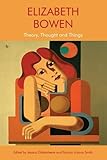Elizabeth Bowen : Theory, Thought and Things / Jessica Gildersleeve, Patricia Juliana Smith.
Material type: TextPublisher: Edinburgh : Edinburgh University Press, [2022]Copyright date: ©2019Description: 1 online resource (216 p.)Content type:
TextPublisher: Edinburgh : Edinburgh University Press, [2022]Copyright date: ©2019Description: 1 online resource (216 p.)Content type: - 9781474458641
- 9781474458665
- 823/.912 23
- PR6003.O6757 Z6238 2019
- PR6003.O6757 Z6238 2019
- online - DeGruyter
| Item type | Current library | Call number | URL | Status | Notes | Barcode | |
|---|---|---|---|---|---|---|---|
 eBook
eBook
|
Biblioteca "Angelicum" Pont. Univ. S.Tommaso d'Aquino Nuvola online | online - DeGruyter (Browse shelf(Opens below)) | Online access | Not for loan (Accesso limitato) | Accesso per gli utenti autorizzati / Access for authorized users | (dgr)9781474458665 |
Frontmatter -- Contents -- Acknowledgements -- Introduction: Thinking in/about Bowen -- 1 How to Be Yourself – But Not Eccentric: Clothes, Style and Self in Bowen’s Short Fiction -- 2 Elizabeth Bowen: Surrealist -- 3 Elizabeth Bowen and the Pleasure of the Text -- 4 Obnoxiousness and Elizabeth Bowen’s Queer Adolescents -- 5 Tender Ties: Elizabeth Bowen and Habit -- 6 ‘One is Somehow Suspended’: Elizabeth Bowen, Katherine Mansfi eld and the Spaces in Between -- 7 ‘How Much of Nothing There Was’: Trying (Not) to Understand Elizabeth Bowen -- 8 Bowen’s Recesses: From Realism to Inter-Objectivity -- 9 ‘Some Really Raging Peculiarity’: Female Fetishism The Little Girls -- 10 Housekeeping and the Fiction of Subjectivity in Eva Trout -- 11 Elizabeth Bowen on the Telephone -- Notes on Contributors -- Index
restricted access online access with authorization star
http://purl.org/coar/access_right/c_16ec
Explores Elizabeth Bowen’s significant contribution to twentieth-century literary theoryProvides new avenues for research in Bowen studies in ways that are concerned primarily with Bowen’s perception of writing and narrativeMoves away from perceptions of Bowen’s writing tied to existing ideological categories, such as viewing her work through a lens of psychoanalysis, modernism, or Irish or British history and which emphasise Bowen’s innovation not as central to our understanding of the changes happening in twentieth-century literature and history, but as instead a point of ‘difficulty’Recognises Bowen’s innovation, experimentation and her impact on her contemporaries and literary descendants From experiments in language and identity to innovations in the novel, the short story and life narratives, the contributors discuss the way in which Bowen’s work straddles, informs and defies the existing definitions of modernist and postmodernist literature which dominate twentieth-century writing. The eleven chapters present new scholarship on Bowen’s inventiveness and unique writing style and attachment to objects, covering topics such as queer adolescents, housekeeping, female fetishism, habit and new technologies such as the telephone.
Mode of access: Internet via World Wide Web.
In English.
Description based on online resource; title from PDF title page (publisher's Web site, viewed 29. Jun 2022)


